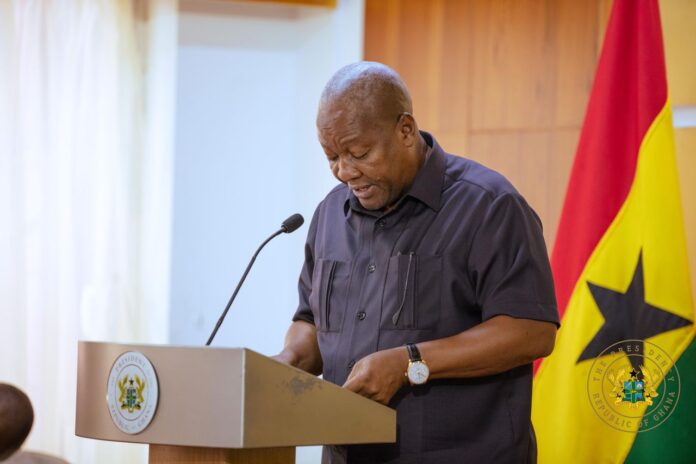President John Mahama has called on Japanese businesses to seize investment opportunities in Ghana as part of the country’s bold economic transformation agenda anchored on his proposed $10 billion “Big Push” initiative.
Speaking at the Ghana Presidential Investment Forum on the sidelines of the 9th Tokyo International Conference on African Development (TICAD IX) on Wednesday, Mahama said Ghana was a stable, democratic and business-friendly gateway to West Africa and the African continent.
“Ghana is a stable, democratic, business-friendly gateway to West Africa and the continent. We have a growing consumer market with improving macroeconomic fundamentals, clear reforms to lower the cost of doing business, and abundant opportunities for technology transfer,” he said.
He explained that Ghana’s strategic geographical position, coupled with its role as host of the African Continental Free Trade Area (AfCFTA), made it an ideal base for Japanese investors seeking to access regional and continental markets.
“Strategic geographical location. Ghana is a country through which the meridian and the UK intersect. The two intersect in Ghana’s territory just a few kilometres from our shore, and it’s also the host country for the African continental free trade area,” Mahama said.
Highlighting recent macroeconomic gains, the President pointed to falling inflation and a stabilised cedi, which he described as the world’s best-performing currency this year.
“Inflation rose to a high of almost 23% in 2024 and it’s currently down to 13.7% and we expect that by the end of the year to hit single digit. And it’s also our city has also stabilised.
“For those of you who know the history of the Ghanaian city, it’s been one of the most volatile currencies in Africa, and a few years back, we were said to be the worst-performing currency. I’m happy to announce that this year, the Ghana cedi has been the best-performing currency in the world,” he declared.
Mahama also announced reforms to the Ghana Investment Promotion Centre Act to remove barriers for smaller investors.
“In the reviewed Ghana Investment Promotion Centre Act. We are removing those minimal capital investments. This will enable any investor, however little money you have – $100,000, $50,000 – to be able to come in and set up a business in Ghana,” he said.
Turning to priority sectors, Mahama urged Japanese companies to expand their footprint in agribusiness, automobile manufacturing, and energy, where Ghana holds a comparative advantage.
“Japan has a comparative advantage when it comes to automobile manufacturing. And like I said, using the opportunity to be able to export into not only our sub-region, but into Africa. Then Ghana becomes a good place for local assembly of automotive products,” he noted.
On agribusiness, Mahama referenced Ghana’s abundant resources, including arable land, sunshine, and the Volta Lake, to highlight investment prospects in agro-processing and textiles.
“We have millions of hectares of land that border that huge lake, and the water can be used to bring about 2 million hectares of land under irrigation.
“But also, we intend to establish industrial parks, you know, so that we can process agri products. We can invest in textile manufacture for export into the EU markets, into the American market and other places,” he said.
Mahama further stressed Ghana’s strong foundation in energy generation, underpinned by hydropower and gas-to-power production, which allows the country to sell surplus energy to neighbours at competitive costs.
“Our thermal plants are being run on gas. We’re bringing new gas fields into operation. And because we are members of the West African Power Pool, energy transmission systems are interconnected with our neighbouring countries.
“And so any excess of power we’re able to produce we can evacuate and sell to our neighbouring countries because we have a comparative advantage when it comes to power,” he explained.
He said the $10 billion “Big Push” programme would drive industrial growth, enhance food security, boost supply chains, and position Ghana as Africa’s manufacturing and export hub.
“Our vision is anchored in our 10 billion big push. And the $10 billion big push is a program to improve the infrastructure of our country, especially in the road sector, in the industrial sector, agro agro-processing space and all that. So we’re investing $2 billion a year in infrastructure development,” Mahama stated.
Calling for closer ties between Accra and Tokyo, Mahama urged Japanese investors to consider joint ventures, public-private partnerships, and collaborations with local firms.
“As I said, we wish to because of the discipline, quality standards and industrial wisdom that Japanese businessmen have, we wish to encourage Japanese businessmen to look towards Ghana. Africa is the next frontier for investment.
“Most parts of the world are saturated when it comes to investment. Africa is opening up, growing, and is a place that Japan should be looking at. And so let us marry Japanese precision with Ghanaian potential and create a win-win situation for ourselves,” he said.
Mahama concluded by reaffirming his commitment to building a strong Ghana–Japan partnership: “Ghana is open for business 24 hours a day, and at this decisive moment in our history. We’re working towards the economic transformation of Ghana.
“Our nation is embracing a bold vision, one that harnesses innovation, industrialisation and regional integration to unlock the full potential of our people and our resources.”
Source: Abubakar Ibrahim



